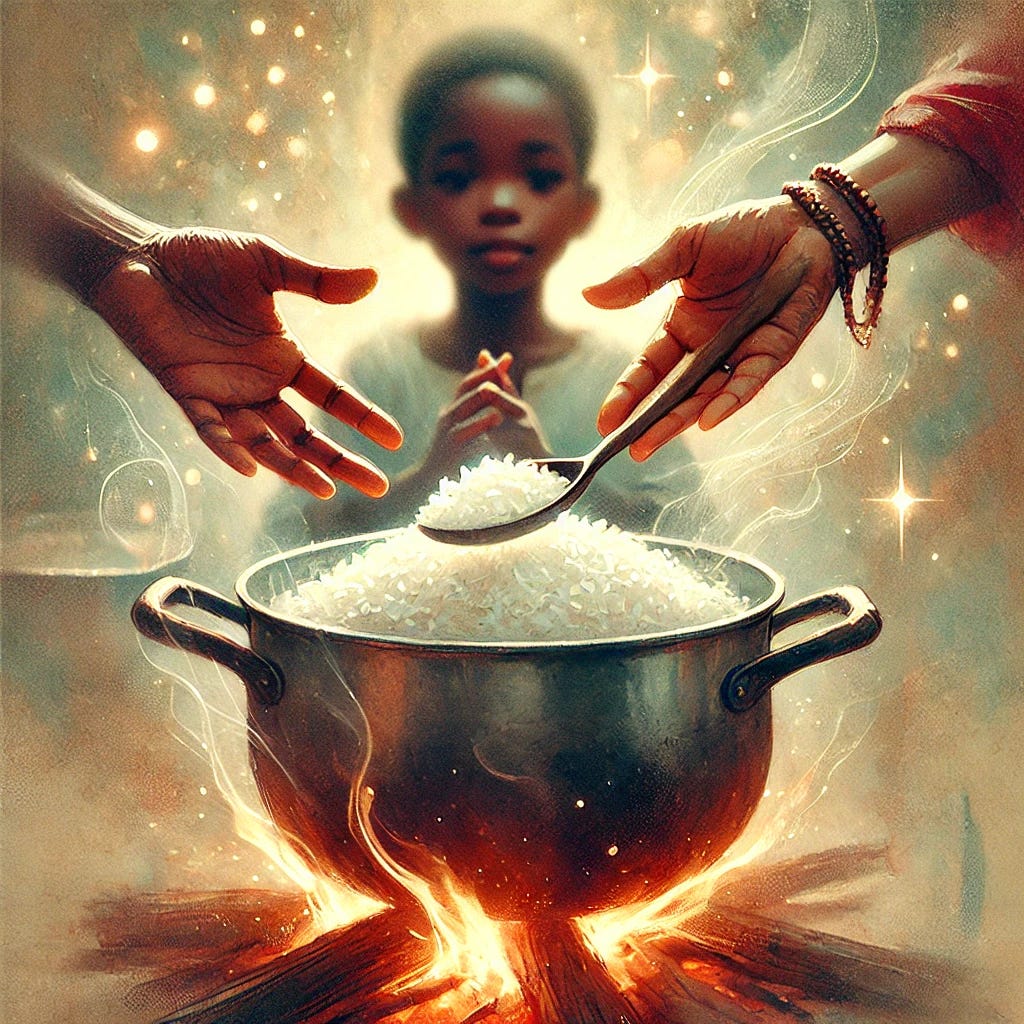How My Step-Mother Prepared Me for Life in Japan Without Knowing It
Adama shares how a lesson in cooking from his stepmother taught him an unexpected life skill that’s helped him survive halfway across the world.
The first thing I learned to cook was rice. I was ten.
My stepmother stood beside me, showing me every step: how to start the fire, wash the rice, and boil water. The smoke stung my eyes, the flames heated my skin, and my palms were clammy, but I felt a sense of responsibility as I worked alongside her in our makeshift kitchen.
She walked me through each step, and I took notes in a little notebook: exactly how much water to add to the rice, how long to let it cook, and how to check it as it simmered. She was patient, always making sure I understood.
The next day, it was my turn to try doing it on my own. Before I started, I remember telling her not to help me unless I made a mistake. Then I took out my notebook and followed my scrawling handwriting through the process. I wanted to prove I could do it—that I could stand on my own, be responsible, and help provide for our family. So my stepmother stood nearby, arms crossed, watching me quietly and murmuring corrections occasionally with a half-smile on her face.
(Here is a video I took of my home a few years ago where you can see what our cooking area or “kitchen” looks like, as well as the rest of our home.)
What she was actually teaching me had little to do with food. It wasn’t common to teach boys to cook in The Gambia—it still isn’t. But my father and stepmother had grown up very poor, and they were determined to make sure each of their children knew how to take care of themselves, regardless of their gender. My stepmother would often say, “You never know where you’ll end up, but if you can cook, you’ll always be okay.” Neither of us could have ever imagined just how accurate this would be—and how it would help me survive on the other side of the world one day.
As I grew older, the cooking continued. I took on more complex dishes—domoda, jollof rice, and stews—and found that cooking was no longer just a task; it was a way to connect with my family. It gave me a sense of pride, a sense of purpose.
In the years that followed, I went through a period where I didn’t cook as much. My father sent me to live with my aunt so that I could attend a better high school. During this time, I had less responsibility for preparing meals. But when I arrived in Japan, living alone, my stepmother’s voice immediately snapped into my mind. I didn’t have anyone to cook for me. But I knew how to take care of myself—my parents had made sure of that. So I didn’t panic, and I didn’t starve. It took a few tries to jog my memory, but my cooking skills slowly came back to me.
I now cook almost every day in my little shared Tokyo apartment. It’s usually something simple like pasta with eggs and onions, but even that feels like a small victory. It’s a reminder that I can take care of myself, no matter where I am in the world. And more than that, I find joy in it. I feel the connection to my past, to my stepmother’s lessons, and to the person I’ve become through it all.
(Here is a video I took a few weeks ago of me cooking in Tokyo apartment. This is the typical meal I cook for myself on busy school days.)
When my friends taste my food and say, “This is good,” I smile. Not because I want to be a chef, but because I remember where it all began. I remember that smoky fire and the sound of my stepmother’s voice, gently guiding me.
My stepmother knew what she was doing all those years ago. She taught me how to stay grounded, how to always make do with what I have, and how to survive life’s challenges with grace.
Help Us Keep Adama in School
Adama’s college journey has only been possible because of the generosity of people like you. Every step—from getting his visa to stepping onto campus—was funded by donors who believe in his dream.
Will you consider becoming one of them?
Every paid subscription goes 100% toward his tuition and school expenses.
Choose a plan that works for you:
$5/month
$150/year
$500/year (Founding Donor)
Or make a one-time gift of any amount.
In a world full of heavy headlines, this is one small way to create the kind of good news we all want to see more of.
Paid subscribers don’t just read the story—they become part of it.






This is terrific Adama! It's great to see you in action and know that you have such a wonderful life skill that so many college students lack. We are all cheering for you! Hugs :)
It’s amazing how no matter where you are in the world the fundamentals are still the same! Truly a great story!